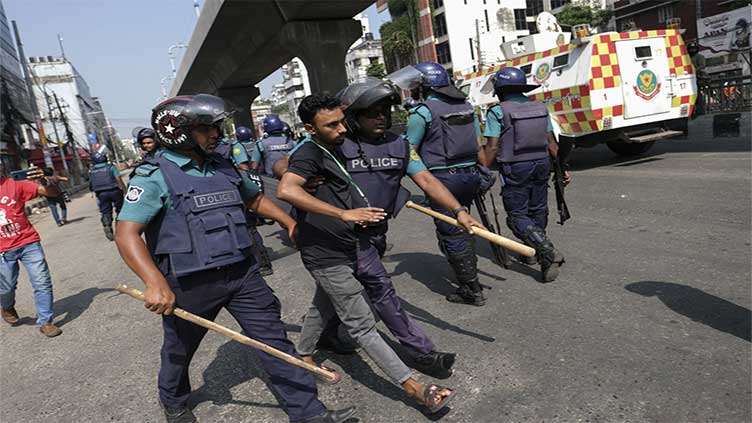Police in Bangladesh disperse garment workers protesting since the weekend to demand better wages

World
Police in Bangladesh disperse garment workers protesting since the weekend to demand better wages
DHAKA, Bangladesh (AP) — Police in Bangladesh’s capital Thursday used tear gas and stun grenades to disperse more than 1,000 garment factory workers who took to the streets for a sixth straight day to demand better wages.
In the Gazipur industrial district, just outside Dhaka, thousands of others also protested amid frustration over higher commodity prices, rent and other bills. In both Dhaka and Gazipur, about 300 factories employing thousands of workers remained closed Thursday, authorities said.
Bangladesh is the second largest garment-producing country in the world after China with its nearly 3,500 factories. Some 4 million workers are employed in them, most of them women, according to the Bangladesh Garment Manufacturers and Exporters Association, or BGMEA. The workers get 8,300 takas, or $75, as a monthly minimum wage and they often need to work overtime to make ends meet, labor unions and workers say.
Nazmul Hasan Firoz, additional deputy police commissioner at Pallabi in Dhaka’s Mirpur area, said police dispersed the workers “peacefully” using tear gas as they blocked streets and vandalized some factories.
He declined to say whether anyone was injured in the action but that the protesters threw rocks at security officials who used armored vehicles to roam the streets.
“For the last two-three days, protests broke out in Mirpur. They demonstrated this morning too … we tried to disperse them peacefully,” he told The Associated Press at the scene.
Bangladesh has maintained stable economic growth for years, but rising inflation has become a major challenge, especially for the poor and middle class.
“How can the people live their lives while the price of everything is this much? In Mirpur area, a typical family, unless they live in a slum, has to spend around 9,000 takas ($82) as home rent,” a female garment worker told The Associated Press. She declined to give her name for fear of harassment in Mirpur.
“If the price of one liter (of cooking) oil is 180-190 takas ($1.62), how can the people afford it and live their lives? Doesn’t the government understand these things? Why the workers have to make demands?”
The workers’ protests began over the weekend after the BGMEA offered to increase the monthly minimum wage by 25% to $90, instead of the $208 demanded by the workers. The BGMEA says factory owners are under pressure because global brands in Western countries are offering less than before.
Owners argue that production cost have also increased in factories because of higher energy prices and transportation cost have also increased globally.
Bangladesh annually earns about $55 billion from exports of garment products, mainly to the United States and Europe. The country is exploring new markets like Japan, China and India amid a global economic slowdown.
The workers’ protests are taking place as tensions rise over the coming general election pitting the ruling Awami League party — led by Prime Minister Sheikh Hasina — and the main opposition group, the Bangladesh Nationalist Party, led by Hasina’s rival former Prime Minister Khaleda Zia.
At least six people, including a policeman, have died in nationwide anti-government protests, triggering fear of further political chaos ahead of the election expected to be held in early January.


